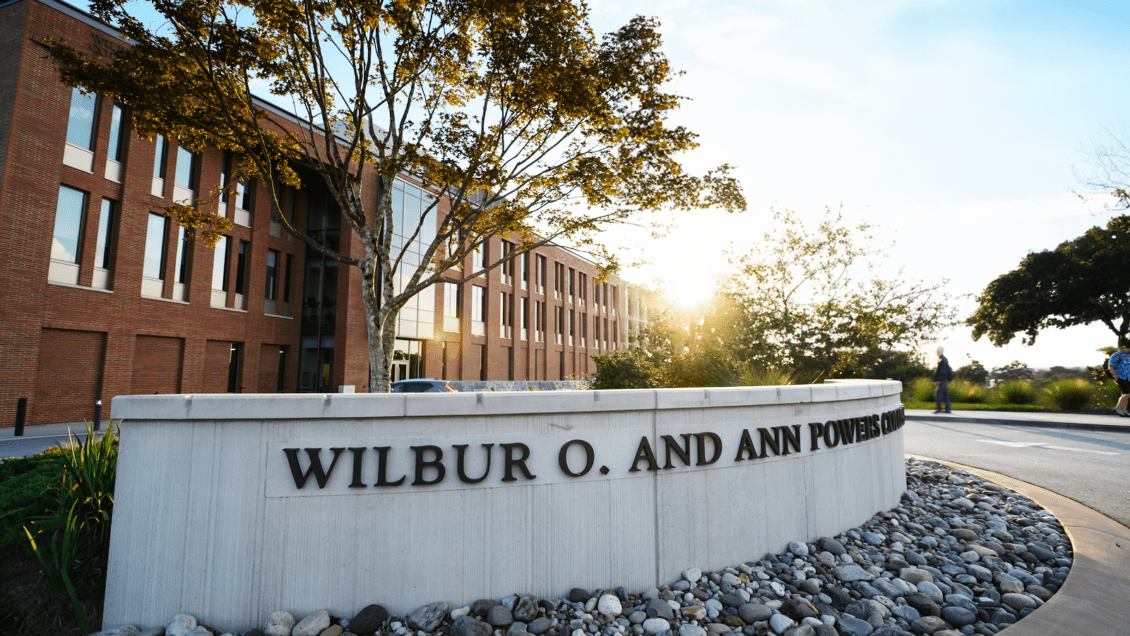The Wilbur O. and Ann Powers College of Business renewed the recognition of four Powers Distinguished Fellows for their remarkable contributions to research and their commitment to academic excellence. The Powers Fellows help lead the college and Clemson University’s research community by fostering innovation and demonstrating expertise through groundbreaking business research. This year, the award was renewed in recognition of the following faculty:
- Kristin Scott, professor, Department of Management
- Amy Ingram, associate professor, Department of Management
- Derek Dalton, professor, School of Accountancy
- Scott Swain, professor, Department of Marketing
Kristin Scott, professor, Department of Management

Scott collaborated on research that analyzes the role of mindfulness in the workplace. The research was recently published in the Journal of Applied Psychology, a Financial Times Top 50 journal (“Being Present and Thankful: A Multi-Study Investigation of Mindfulness, Gratitude, and Employee Helping Behavior,” 2022). Across two experimental studies, the researchers examined the effects of mindfulness on an employee’s willingness to perform helping behavior. Helping behavior is when an employee displays an initiative to assist in work-related tasks, whether for a coworker or to prevent an issue. The results demonstrated a positive correlation between employee mindfulness and helping behaviors, showing the benefits of mindfulness training within the workplace. Scott is currently working on another study detailing the effects of mindfulness on the success of musicians during and post-pandemic.
Amy Ingram, associate professor, Department of Management

Ingram is passionate about her research in analyzing strategic leadership language and characteristics at an aggregate level and the political aspects of non-market activity. Her most recent co-authored study, “Avoidance and Aggression in Stakeholder Engagement: The Impact of CEO Paranoia and Paranoia-relevant Cues,” is accepted for publication in the prestigious Academy of Management Journal and explores how CEO paranoia affects a company. Using computerized text analysis to connect the type of language CEOs use with personality traits, the researchers used aggregate indicators and econometrics to find that CEOs who tested higher for subclinical paranoia tended to avoid engaging in competition. She is currently working as a contributing author to eight papers, including one studying the language female CEOs use and how it impacts their performance.
Derek Dalton, professor, School of Accountancy

Dalton researches work-life balance and employee turnover within the accounting profession. His most recent study analyzed the impact of pandemic stress and role overload on public accountants. The research findings demonstrated an increased amount of stress and role overload for female public accountants when compared to their male counterparts during the pandemic. They found that higher role overload and stress for women public accountants during the pandemic led to a shift in priorities for women public accountants. For example, they found that women public accountants started to focus more on their work-life balance and less on their place within the company hierarchy following the pandemic. Further, this shift in priorities led to greater turnover rates for female public accountants. This is problematic because public accounting firms have intentionally tried to increase female partner representation over the decades. Now, with an increase in female public accountant turnover, this lack of representation may present a long-term problem for public accounting firms.
Scott Swain, professor, Department of Marketing

Swain has research interests in the psychology of innovations – examining how people learn about, adopt, adapt to, or reject new technology. His most recent research develops a framework for dynamic testing of augmented reality (AR) applications in retail environments. The framework helps AR developers build apps that are more useful for consumers (including improving accessibility) while also serving as a live research platform for marketers. Swain also recently published research on virtual sommeliers installed on kiosks in wine shops. Clickstream analyses revealed that differences in customers’ interactions with the virtual sommeliers reflected not only differences in category knowledge but also differences in store context (type, layout, promotions, and selection variety). The methodology introduced in this research offers retailers a new approach for optimizing store spatiality.
To learn more about Powers College of Business research, visit our Research Highlights page.
Get in touch and we will connect you with the author or another expert.
Or email us at news@clemson.edu

